This year, from February 8–10, the 11th Regional 3R (reduce, reuse, recycle) and Circular Economy Forum in Asia and the Pacific was held in Siem Reap, Cambodia, jointly organized by the Ministry of Environment of Japan, the United Nations Center for Regional Development (UNCRD), and the Ministry of Environment of Cambodia. At the event, representatives from 38 countries in the Asia-Pacific region gathered together to engage in lively discussions on issues to promote the 3Rs. Among the participants at the event were Ms. Yurie Imaeda and Mr. Ryohei Takahashi from the Mercari Public Policy Team. The two Mercari representatives introduced the other participants to collaborative reuse initiatives that Mercari is leading with local governments in Japan, emphasizing how important the concept of reuse is to a circular economy.
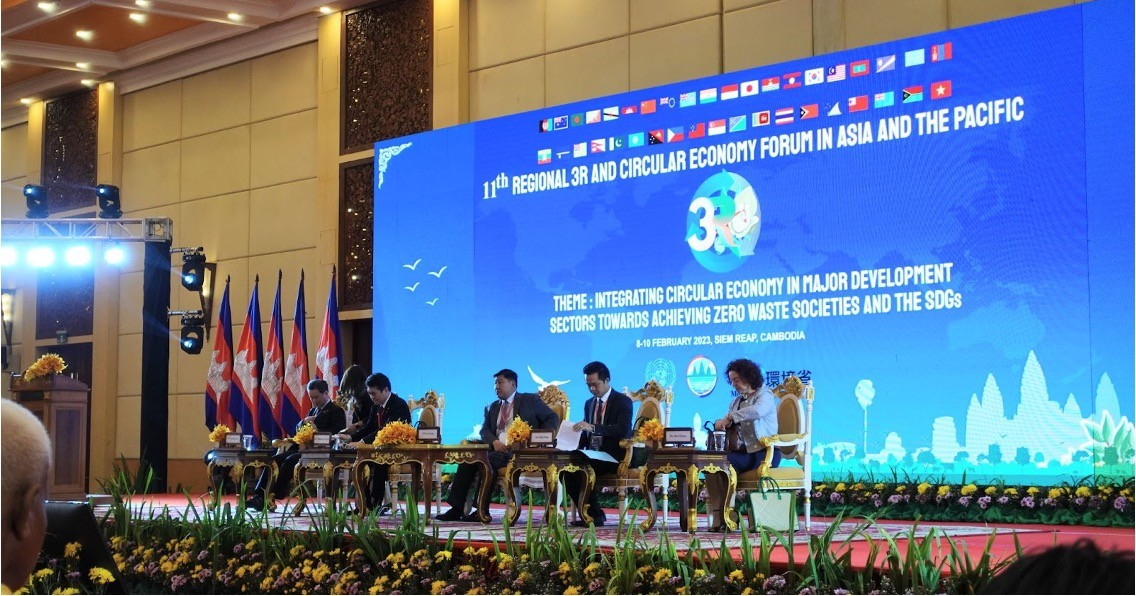 Keynote speech at the Regional 3R and Circular Economy Forum in Asia and the Pacific
Keynote speech at the Regional 3R and Circular Economy Forum in Asia and the Pacific
|
About the Regional 3R and Circular Forum in Asia and the Pacific: The Hanoi 3Rs Forum was established, based on a proposition from Japan, to promote the 3Rs in Asia. The Forum was created to be a collaborative foundation for a wide range of stakeholders, including governments, international bodies, aid agencies, private sector organizations, research institutions, and NGOs. In March 2013, the Forum adopted the Hanoi 3R Declaration, which has set targets for the promotion of the 3Rs in the Asia-Pacific region over the following 10 years. It also defines key indicators by which the progress toward achieving each target can be monitored. |
Each day of the event there were numerous advanced-level sessions held by representatives of various countries, public and private sector officials, and academic experts, as well as booths where participating companies could introduce their own initiatives and activities to the other attendees; it was truly diverse and widely covered, with simultaneous interpretation services available at the venue and TV stations and other media outlets also onsite to report on the event.
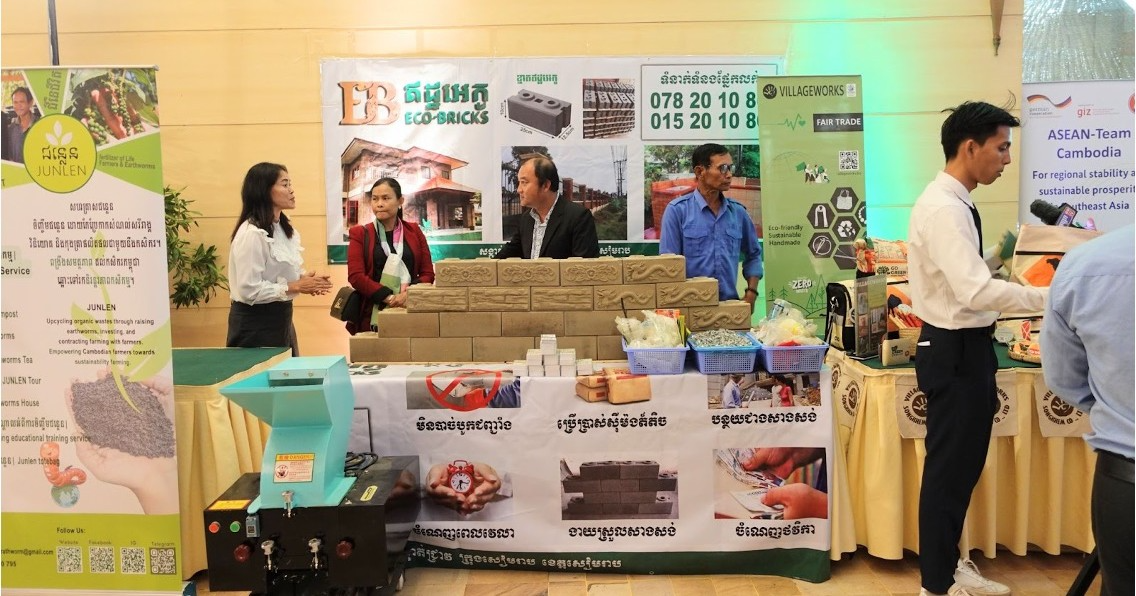 Company booths at the venue
Company booths at the venue
Many influential leaders were present at the opening ceremony on February 8, including Mr. Say Samal, Cambodian Minister of Environment, Mr. Shigeki Kobayashi, Japanese State Minister of Environment, and Mr. Kazushige Endo, Director of the United Nations Center for Regional Development.
Among other comments, State Minister Kobayashi emphasized that, while rapid economic growth definitely brings economic benefits, it also poses serious environmental and social challenges, and that it is now more important than ever before to address these challenges with the 3Rs.
Director Endo pointed out the importance of collaboration among government entities, private companies, and citizens, saying that efforts made toward achieving a circular economy require collaboration and partnership among multiple stakeholders (interested parties).
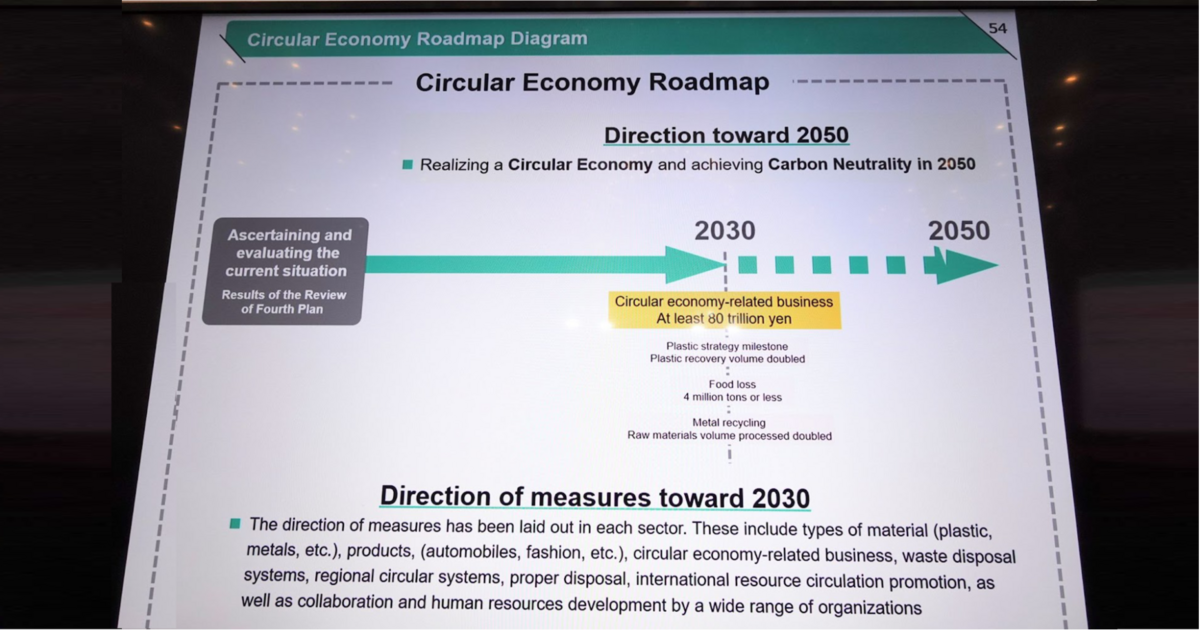 Japan's roadmap toward achieving a circular economy—includes regional circular systems, inter-organizational human resource development, and collaborative measures
Japan's roadmap toward achieving a circular economy—includes regional circular systems, inter-organizational human resource development, and collaborative measures
Another notable part of the event was when Mr. Toshiaki Suzuki, Gamagori City Mayor, presented examples of Gamagori City's implementation of the “Circular City” concept, which included collaborative efforts with Mercari. Additionally, Ms. Yurie Imaeda, Manager of Mercari’s Public Policy Team, participated in a panel discussion on the theme of a circular society.
During the presentations in the panel, comments were made such as, "Recycling is the last resort. We need to pay more attention to reduce (waste reduction) and reuse, which are the preliminary steps, and take them up as policy issues.
At the panel discussion, Ms. Imaeda was able to emphasize that recycling should be a last resort, predicated on the first two steps of the 3Rs—“reduce” (decreasing the overall amount of waste generated) and “reuse,” concluding that we should be making policies focused on those two elements.
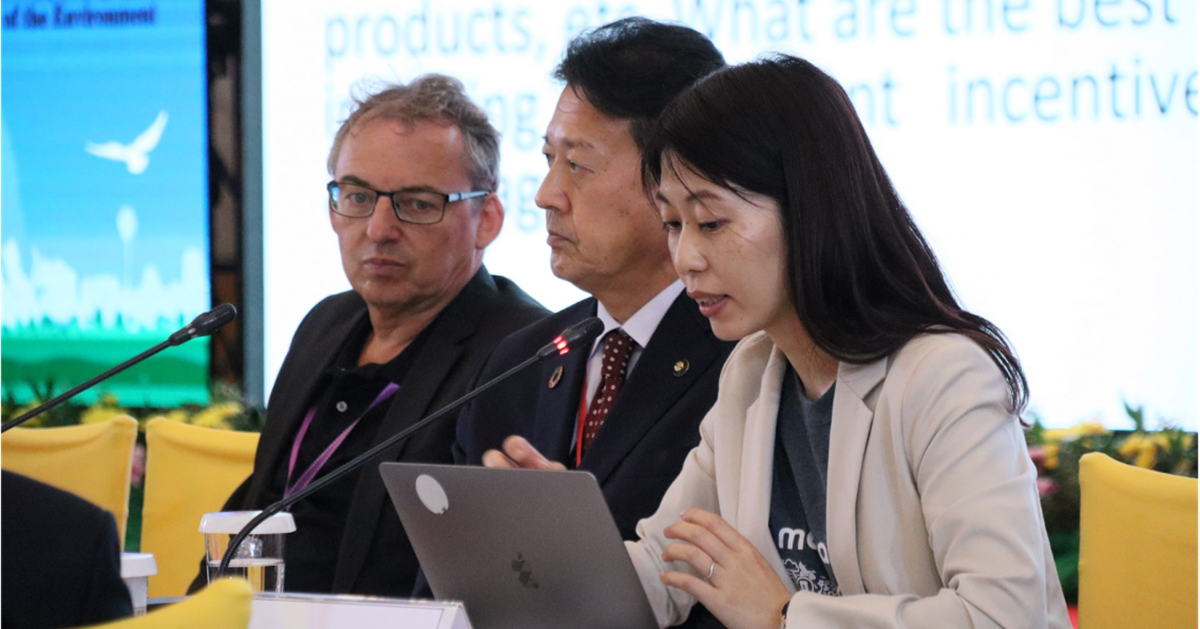 Ms. Imaeda speaking as a panelist next to Mayor Suzuki
Ms. Imaeda speaking as a panelist next to Mayor Suzuki
Ms. Imaeda also spoke about the positive impact on reuse that comes from people using Mercari, as well as the importance of considering whether an item can be reused before it is recycled. She stated that public-private partnerships are low cost in terms of system usage and effective for matching, highlighting the fact that they have also led to a change in public awareness.
Below is an excerpt from Ms. Imaeda’s comments at the event.
|
“Mercari Group aims to create a circular economy and in doing so contribute to efforts to address climate change. When someone discovers an item that they need or want on Mercari that is no longer needed by the item’s lister, it gets reused instead of wasted, thereby creating new value. What’s important to note here is that reuse has a huge positive impact toward a circular economy. We know that, looking at just the clothing category, the Mercari platform (counting both Japan and the US) has reduced CO2 emissions by about 480,000 tons per year and avoided about 8.8% of Japan's annual clothing waste. Recycling our generated waste is of course important, but it is also important to consider reusing items before they become waste. Now more than ever, private companies are looking for ways to reuse old inventory, equipment, and other items that would have previously been considered waste. The time is now. In order to make reuse—the second of the 3Rs—as ubiquitous in the world as recycling, we need support and assistance from governments, municipalities, academia, and NGOs to promote and expand reuse initiatives." |
*Figures are from the FY2022 Mercari Sustainability Report
After the panel discussion, intrigued representatives from other countries came asking for more details. The initiative was very well received and some people were even saying that they would like to try a version of it in their own countries as well.
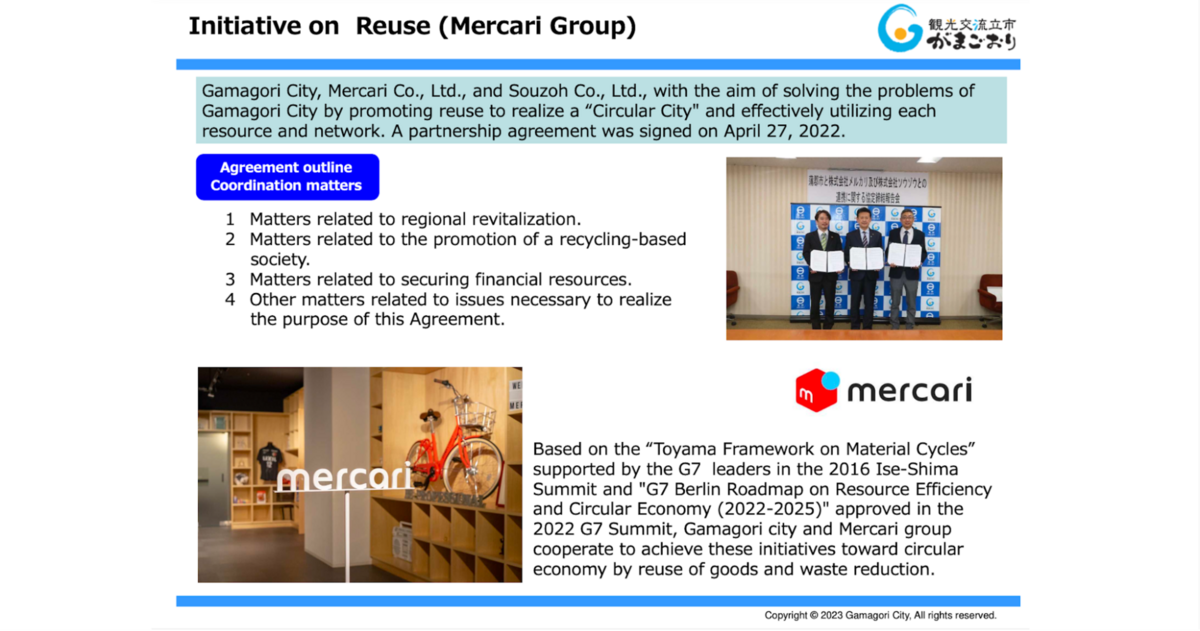 A slide from Gamagori Mayor Suzuki's presentation
A slide from Gamagori Mayor Suzuki's presentation
In the first part of Mayor Suzuki’s presentation, he introduced Gamagori City's efforts toward becoming a “Circular City,” including the sale of oversized garbage items (for example, appliances such as refrigerators, etc.) using Mercari Shops and a demonstration experiment using Mercari Eco Box.
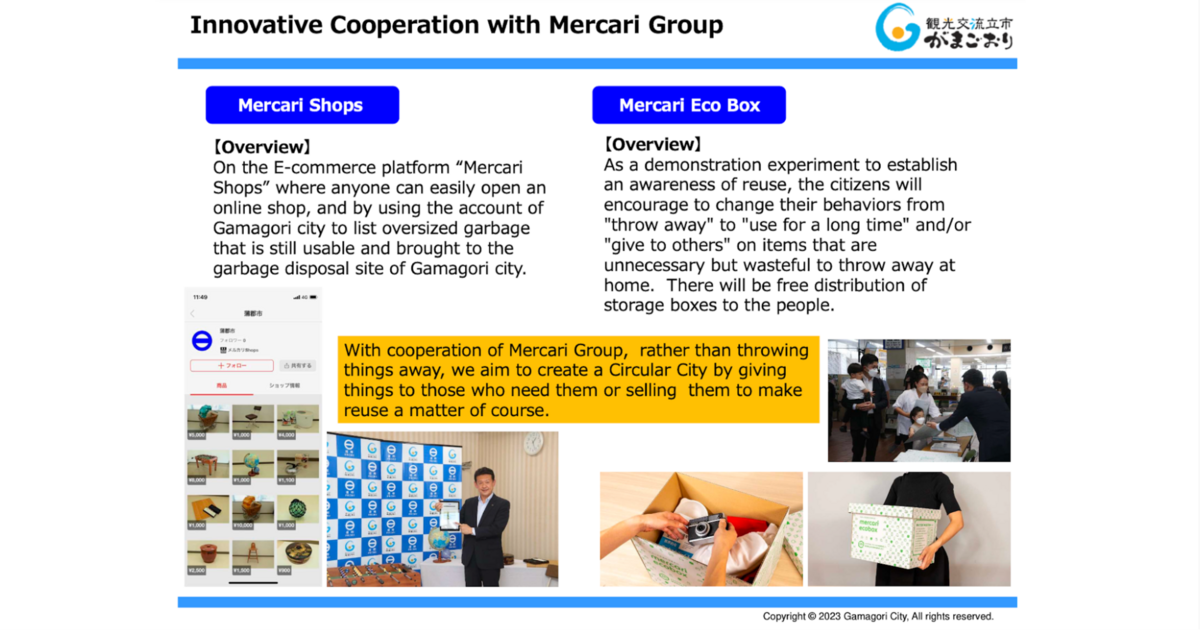 Another slide from Gamagori Mayor Suzuk's presentation
Another slide from Gamagori Mayor Suzuk's presentation
|
Mercari and Gamagori City’s collaborative initiative (which also included other local government bodies) of selling oversized garbage items through Mercari Shops was recently recognized by Japan’s Cabinet Office as an excellent example of public-private partnership for the local development of SDGs. https://merpoli.mercari.com/entry/2023/02/08 (Japanese only) Click here to read an interview with the Mayor of Gamagori about his city’s collaborative efforts with Mercari. https://merpoli.mercari.com/entry/2023/01/04 (Japanese only) |
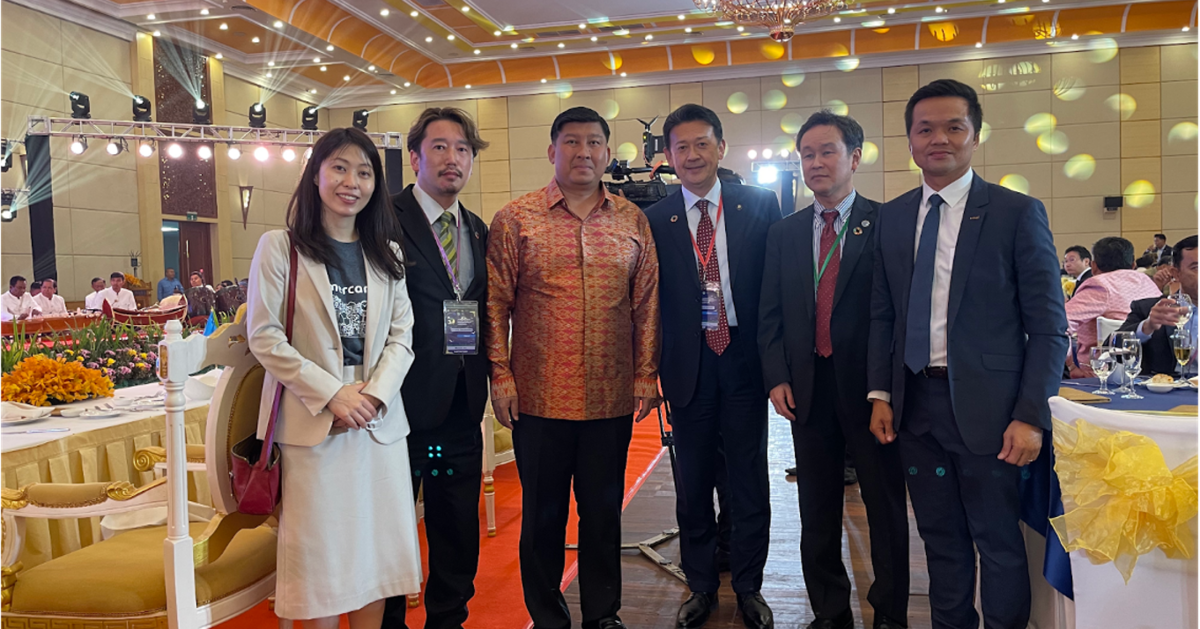 From left to right: Ms. Imaeda and Mr. Takahashi from Mercari’s Public Policy Team; Mr. Say Samal, Cambodian Minister of Environment; Mr. Toshiaki Suzuki, Gamagori City Mayor; Mr. Kazushige Endo, Director of the United Nations Center for Regional Development; and Mr. Pak Sokharavuth, Director General, General Directorate of Environmental Protection, Ministry of Environment, Cambodia
From left to right: Ms. Imaeda and Mr. Takahashi from Mercari’s Public Policy Team; Mr. Say Samal, Cambodian Minister of Environment; Mr. Toshiaki Suzuki, Gamagori City Mayor; Mr. Kazushige Endo, Director of the United Nations Center for Regional Development; and Mr. Pak Sokharavuth, Director General, General Directorate of Environmental Protection, Ministry of Environment, Cambodia
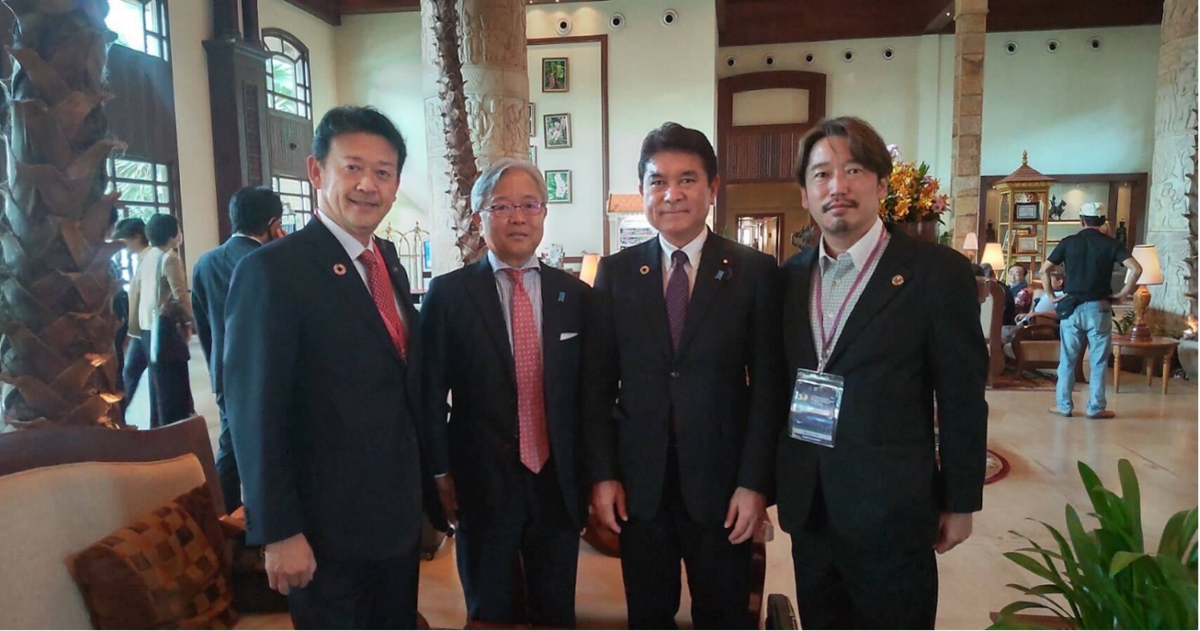 From left to right: Mr. Toshiaki Suzuki, Gamagori City Mayor; Mr. Atsushi Ueno, Ambassador of Japan to Cambodia; Mr. Shigeki Kobayashi, Japanese State Minister of Environment; and Mr. Takahashi from Mercari
From left to right: Mr. Toshiaki Suzuki, Gamagori City Mayor; Mr. Atsushi Ueno, Ambassador of Japan to Cambodia; Mr. Shigeki Kobayashi, Japanese State Minister of Environment; and Mr. Takahashi from Mercari
The impact of 3R-related initiatives, such as the ones covered in this article, is becoming increasingly apparent among G7 countries, with Toyama Prefecture’s “Toyama Framework on Material Cycles,” which was approved at the 2016 Ise-Shima Summit, being adopted into the Berlin Roadmap for the 2022 G7 Summit. Looking ahead to the next G7 Summit scheduled to take place in Hiroshima in May of this year, we hope that efforts to promote reuse will gain even more traction worldwide, bolstered by the influence and impact of the 3R Forum.
(Yurie Imaeda)
日本語版はこちらから
